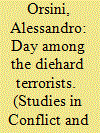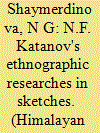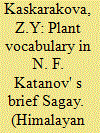|
|
|
Sort Order |
|
|
|
Items / Page
|
|
|
|
|
|
|
| Srl | Item |
| 1 |
ID:
120442


|
|
|
|
|
| Publication |
2013.
|
| Summary/Abstract |
This article describes the experience of a sociologist who made contact with a group of diehard terrorists responsible for multiple murders in order to conduct an ethnographic study. After outlining the sociological profile of the diehard terrorists, the author-making reference to the ethnographic studies of Jack Douglas, Martin Sanchez Jankowski, and Laud Humphreys-describes how he followed their traces. The aim of the article is to analyze the psychological costs that the sociologist must pay when he interacts with men and women who, in addition to proudly claiming credit for the homicides they have committed, affirm the importance of continuing to kill in order to salvage humanity's future.
|
|
|
|
|
|
|
|
|
|
|
|
|
|
|
|
| 2 |
ID:
132935


|
|
|
|
|
| Publication |
2014.
|
| Summary/Abstract |
This article applies ethnographic methods and historical analysis to explore Jewish-Arab relations within Israeli freemasonry. This article tracks local Masonic history as the fraternity development from individual lodges under colonial like obedience's in late Ottoman and Mandate -era Palestine into a national level organization, under the ground lodge of the state of Israel. In light of an official position of political noninvolvement, Jewish and Arab-Palestine members conveyed shared value of universal fraternity, but variable interpretation of citizenship and nationalism.
|
|
|
|
|
|
|
|
|
|
|
|
|
|
|
|
| 3 |
ID:
128482


|
|
|
|
|
| Publication |
2013.
|
| Summary/Abstract |
Nickolay Fyodorovich Katanov is one of the outstanding scholar- Turcologists, a researcher of Ural-Altaic world. His creative work was devoted to multidimensional aspects of scientific activity: ethnography and history, linguistics and translation studies, literary studies and folklore, numismatics and museum work, archaeology and local lore. He was also a talented professor whose lectures drew numerous audience at Kazan University. In spite of the multidimensionality of N. F. Katanov's creative activity one of his main merits is the study and research of culture and ethnic world of the Turkic peoples in South Siberia, Eastern Turkestan and Central Asia. Katanov's collection during four years of his travels (1889-1892) of priceless material such as manuscripts and journal records testifies about it. Later these were published in Sketches of Uryzmkhai land.
|
|
|
|
|
|
|
|
|
|
|
|
|
|
|
|
| 4 |
ID:
128483


|
|
|
|
|
| Publication |
2013.
|
| Summary/Abstract |
Nickolay Fyodorovich Katanov was a great scholar, who gathered the richest material in ethnography, linguistics and folklore, providing a valuable source for studying different sides of the Turkic peoples' life, including Khakasses. Being a linguist- Turcologist N. F. Katanov started his scientific work with the study of the Khakass language, which he spoke, and relying on its knowledge, he began to research other related kind red languages. During his study in Krasnoyarsk high school, he went to various places every year, gathered folklore, linguistic texts and described the customs of the Sagay people. A researcher of the Tatar language D. G. Tumasheva notes: "Nicloloy Fyodorovich was not only an educated and intelligent man but he had his own material, which had been written by him from the first hand through direct contact with the people. N. F. Katanov laid emphasis on the latter, considering the necessity to study a language by means of direct interaction with the people and not by separating history of a language from ethnography, folklore and history of material culture."
|
|
|
|
|
|
|
|
|
|
|
|
|
|
|
|
| 5 |
ID:
139664


|
|
|
|
|
| Summary/Abstract |
India and federalizing Nepal represent distinct types of federal polity: their origins lie not in the unification of previously autonomous states, but in the devolution of power by a previously centralized state. The boundaries of their constituent sub-units are therefore open to debate, and settling their contours is central to the project of state-building. Written by a political scientist and an anthropologist, this paper presents a comparative exploration of the reciprocal relationship between state structuring and ethnicity in India and Nepal, with a focus on the effects of territorial versus non-territorial forms of recognition. It pushes against recent tendencies within South Asian Studies to see ethnic identity as called into being solely by state practices or ‘governmentality’ on the one hand, or as a newly commoditized form of belonging produced through neoliberal reforms on the other. Instead it argues that ethnicity must be understood as a multivalent concept that is at once embedded in specific histories of state and sub-state formation, and generative of them. Comparative in scope yet driven by qualitative data collected over years of engagement across the region, the paper charts a middle way between detailed ethnographic studies and large-scale comparative endeavours.
|
|
|
|
|
|
|
|
|
|
|
|
|
|
|
|
| 6 |
ID:
181819


|
|
|
|
|
| Summary/Abstract |
Recalling knowledge and instruction about Central Asia toward the end of the Cold War (1945–91) in the United States, this article provides a retrospective on an anthropologist’s coming of age and ability amidst prevailing interests and convictions concerning the region. It continues to discuss some of the early topics and studies that initiated a grounded approach to understanding Central Asia ethnographically as it broadens the analysis via a consideration of contributions from Europe and Central Eurasia. Not a literature review per se, the article focuses on some major concerns among anthropologists and their subjects since the beginning of independence. It then concludes that while studies have developed in complexity and theory within our field, we continue writing about culture via overarching political and economic systems that inform how we apprehend the world. The multiple and overlapping identities of Central Asians will continue to occupy much of our academic thinking for years to come.
|
|
|
|
|
|
|
|
|
|
|
|
|
|
|
|
|
|
|
|
|